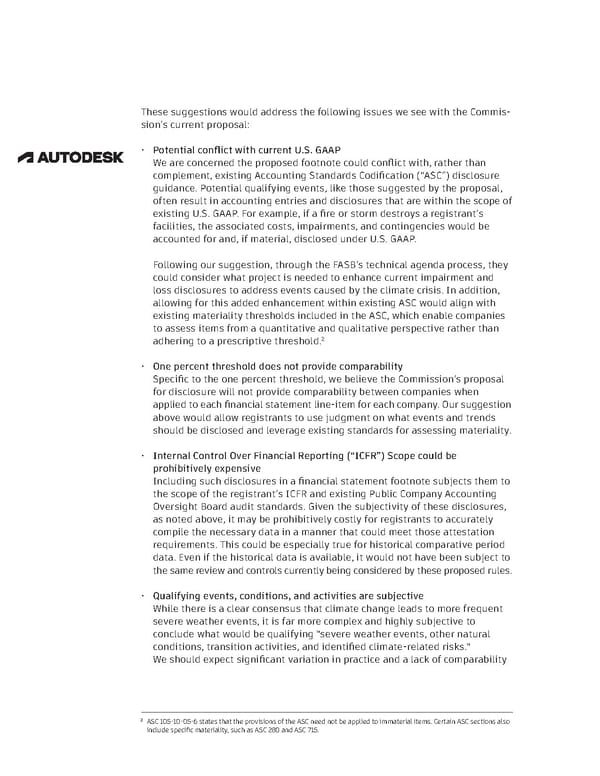These suggestions would address the following issues we see with the Commis- sion’s current proposal: • Potential conflict with current U.S. GAAP We are concerned the proposed footnote could conflict with, rather than complement, existing Accounting Standards Codification (“ASC”) disclosure guidance. Potential qualifying events, like those suggested by the proposal, often result in accounting entries and disclosures that are within the scope of existing U.S. GAAP. For example, if a fire or storm destroys a registrant’s facilities, the associated costs, impairments, and contingencies would be accounted for and, if material, disclosed under U.S. GAAP. Following our suggestion, through the FASB’s technical agenda process, they could consider what project is needed to enhance current impairment and loss disclosures to address events caused by the climate crisis. In addition, allowing for this added enhancement within existing ASC would align with existing materiality thresholds included in the ASC, which enable companies to assess items from a quantitative and qualitative perspective rather than adhering to a prescriptive threshold. 2 • One percent threshold does not provide comparability Specific to the one percent threshold, we believe the Commission’s proposal for disclosure will not provide comparability between companies when applied to each financial statement line-item for each company. Our suggestion above would allow registrants to use judgment on what events and trends should be disclosed and leverage existing standards for assessing materiality. • Internal Control Over Financial Reporting (“ICFR”) Scope could be prohibitively expensive Including such disclosures in a financial statement footnote subjects them to the scope of the registrant’s ICFR and existing Public Company Accounting Oversight Board audit standards. Given the subjectivity of these disclosures, as noted above, it may be prohibitively costly for registrants to accurately compile the necessary data in a manner that could meet those attestation requirements. This could be especially true for historical comparative period data. Even if the historical data is available, it would not have been subject to the same review and controls currently being considered by these proposed rules. • Qualifying events, conditions, and activities are subjective While there is a clear consensus that climate change leads to more frequent severe weather events, it is far more complex and highly subjective to conclude what would be qualifying "severe weather events, other natural conditions, transition activities, and identified climate-related risks." We should expect significant variation in practice and a lack of comparability 2 ASC 105-10-05-6 states that the provisions of the ASC need not be applied to immaterial items. Certain ASC sections also include specific materiality, such as ASC 280 and ASC 715. --.:I AUTODESK
 Autodesk Report Page 2 Page 4
Autodesk Report Page 2 Page 4